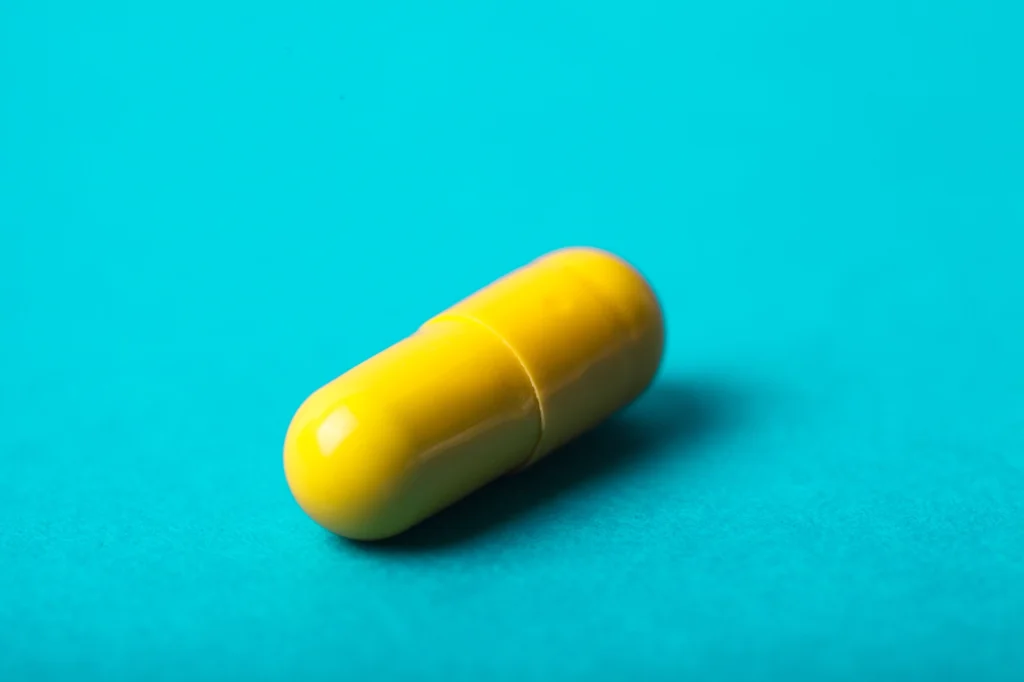Gabapentin is a prescription medication primarily used to treat seizures, nerve pain, and certain types of chronic pain, but it is sometimes misused recreationally for its sedative effects. When taken in higher doses or used in combination with other substances, gabapentin can produce effects that some may describe as a “high,” although this is not its intended use.
What Is Gabapentin?
Gabapentin is a prescription medication that primarily treats certain types of seizures and nerve pain. It was initially developed as an anticonvulsant for people with epilepsy. However, it’s now widely prescribed for various types of chronic pain, especially neuropathic (nerve-related) pain, as well as for conditions like post-herpetic neuralgia (pain following shingles).[1] It may be used off-label for conditions like restless leg syndrome, anxiety, and bipolar disorder.
How gabapentin works is not fully understood, but it’s believed to influence electrical activity in the brain and may modulate neurotransmitters, which are chemicals that help communication between nerve cells.[2] Gabapentin is similar in structure to the neurotransmitter gamma-aminobutyric acid (GABA), but it doesn’t act on GABA receptors directly. Instead, it’s believed to reduce the excitability of nerve cells in a way that can control seizures and alleviate nerve pain.
What Is a Gabapentin High? How Does It Make You Feel?
When you take gabapentin, you may feel drowsy, dizzy, or clumsy at first.[3] Your thinking may be slowed as well. These are common side effects of gabapentin, but they often subside as your body gets used to the medication. It’s best to avoid driving or operating machinery if you feel dizzy, unsteady, or drowsy.
It’s more common to experience intense effects if you take high doses. Many people feel no difference while taking gabapentin other than relief of their symptoms. Some people may experience effects like anxiety, irritability, depression, anger, excitability, and recklessness.[4] One of the rare side effects of gabapentin is suicidal thoughts.
Gabapentin can have other side effects, including:[5]
- Headache
- Weakness
- Uncontrollable shaking
- Memory problems
- Uncontrolled eye movement
- Dry mouth
- Nausea
- Vomiting
- Increased appetite
- Heartburn
- Ear, back, or joint pain
- Flu-like symptoms
Gabapentin Abuse Potential

While gabapentin isn’t a controlled substance on the federal level or considered a drug of abuse, some states have made it a Schedule V controlled substance due to rising evidence of its risks.
For many years, researchers didn’t believe that gabapentin had a potential for misuse. Studies are increasingly indicating that it does have some risk for misuse, especially among younger people who have a higher risk of substance misuse overall.[6] Some risks may include taking larger doses of gabapentin than prescribed or using gabapentin with other substances, such as opioids or alcohol.
People who misuse gabapentin may do so to get different effects, including increased sedation or relaxation, an elevated mood, a high euphoria, dissociation, lowered inhibitions, increased sociability, or a feeling similar to being drunk.[7] People abuse gabapentin at different doses, including therapeutic doses that are commonly prescribed.
Gabapentin may also be misused by ingesting it in combination with other substances, such as opioids, marijuana, stimulants, benzodiazepines, or alcohol. Someone may combine substances to enhance the high or manage withdrawal symptoms associated with other substances. However, taking gabapentin with other depressants, such as opioids or alcohol, can be extremely dangerous and may increase the risk of side effects like seriously depressed breathing.[8]
Signs of Gabapentin Misuse
While the signs of gabapentin misuse can vary, they may include:[9]
- Taking larger doses of gabapentin than prescribed
- Using gabapentin more often than prescribed
- Visiting multiple doctors to get prescriptions
- Claiming symptoms are worse to get a gabapentin prescription
- Forging gabapentin prescriptions
Gabapentin misuse can also progress to compulsive abuse that’s commonly associated with a substance use disorder – or a gabapentin addiction. While there’s no official gabapentin use disorder, the general criteria for a substance use disorder include:[10]
- Using gabapentin in higher doses or for longer periods than initially planned
- Wanting or trying without success to cut back or stop using gabapentin
- Spending a lot of time getting, using, or recovering from gabapentin
- Experiencing strong cravings for gabapentin
- Failing to fulfill obligations at home, school, or work because of gabapentin use
- Reducing or stopping hobbies because of gabapentin use
- Continued gabapentin use despite social or relationship problems
- Taking gabapentin in situations where it can be physically dangerous
- Repeated, unsuccessful attempts to stop using gabapentin
Gabapentin Withdrawal
Using gabapentin regularly can build dependence, which happens when your brain adjusts to the presence of the drug and the changes it causes, so you need to take the drug continuously to function. When gabapentin dependence develops, and you stop taking the drug suddenly, withdrawal symptoms can occur.
Some of the symptoms of gabapentin withdrawal include:[11]
- Anxiety
- Agitation
- Insomnia
- Disorientation
- Confusion
- Nausea
- Pain
- Sweating
- Rapid heartbeat
- Seizures
Gabapentin Overdose
Taking high doses or frequent doses of gabapentin or combining it with other drugs – particularly depressants – can increase the risk of an overdose. When this happens, you may experience symptoms like double vision, slurred speech, excessive lethargy, drowsiness, and diarrhea. It’s possible to have seriously depressed breathing that can be fatal, especially when the drug is combined with opioids or other central nervous system depressants.
Research suggests that roughly 90% of fatal gabapentin-related overdoses also involve opioid use. The risk of a fatal overdose is also increased if you use gabapentin and benzodiazepines, or worse, gabapentin, opioids, and benzodiazepines.
Treating Gabapentin Misuse
Though gabapentin isn’t viewed as an addictive drug like heroin or cocaine, it’s not without misuse and addiction potential. If you’re struggling with gabapentin misuse or addiction, it’s important not to try to stop on your own, especially if you misuse gabapentin with other substances. Doing so can cause intense withdrawal symptoms, some of which may be dangerous depending on the other substances involved.
The first step in getting help for gabapentin addiction or polysubstance use disorder (when you are addicted to multiple substances) is medical detox. Medically managed withdrawal puts you in a safe, comfortable place with medical supervision 24/7 to manage your withdrawal symptoms, reduce the risk of complications, and help you detox safely.
Once detox is complete, it’s best to transition into an addiction treatment program on an inpatient or outpatient basis to address the underlying factors of addiction. While treatment plans are individualized, your plan may include individual therapy, group counseling, peer support groups, and behavioral therapies to learn how to maintain sobriety and adopt healthier habits.
Avoid Gabapentin Misuse
Gabapentin is a generally safe and well-tolerated drug that is used to treat a wide range of conditions, including some seizures and nerve pain. However, gabapentin has misuse potential and risks, especially if you use the drug with other depressants like alcohol, opioids, and benzodiazepines, which can increase the risk of overdose and other adverse effects.


